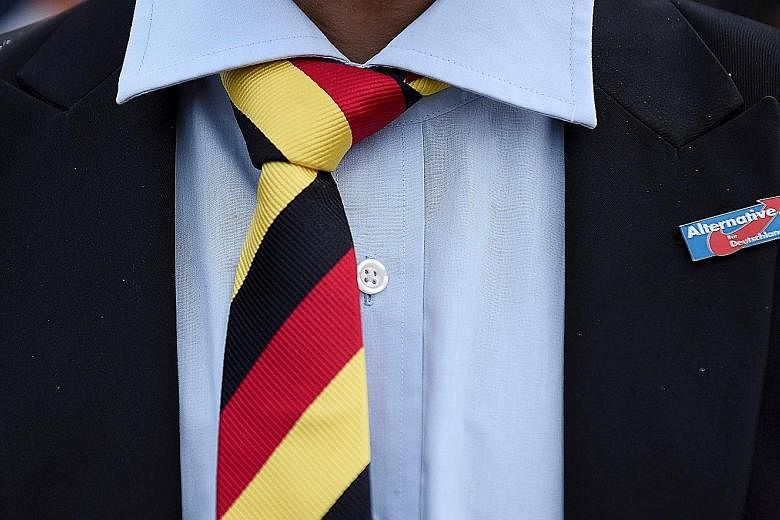BERLIN • Seven months before a national election, the right-wing Alternative for Germany (AfD) is losing voters while parties in neighbouring countries with similar anti-immigrant platforms hold their own against mainstream rivals.
Riddled by infighting, the AfD has seen its support fall by almost a third to around 10 per cent in just two months, as a drop in migrant arrivals has diluted its main function as a conduit for voter concerns about refugees.
It is also up against a reinvigorated Social Democratic Party (SPD) that is well placed to present a genuine challenge to conservative Chancellor Angela Merkel in September's election.
"People are no longer talking about the refugee issue so much and that was the AfD's main vehicle," said Forsa polling institute managing director Manfred Gullner.
So, while anti-immigrant parties in France and the Netherlands, which hold national elections this spring, continue to poll upwards of 15 per cent, recent surveys in Germany show the AfD at between 8.5 per cent and 11 per cent, down from a high of 15.5 per cent at the end of last year, as an internal feud festers.
More than a million migrants have arrived in Germany in the last two years and the AfD has capitalised on voters' fears. But arrivals fell by two-thirds last year and the government is deporting rejected Afghan asylum seekers.
Political scientist Carsten Koschmieder at Berlin's Free University said that posed a problem for the AfD as it gave the impression that the government had got the situation under control.
The party faces an early electoral test on March 26 in the western region of Saarland, where recent polls give it support of 9 per cent to 10 per cent.
The AfD split in two in mid-2015, and another bout of infighting kicked off in January when Mr Bjorn Hocke, its leader in the eastern state of Thuringia, called Berlin's Holocaust memorial a "monument of shame" and said history books should focus more on German victims.
AfD co-leader Frauke Petry and her supporters wanted him expelled but others defended him.
Two-thirds of the executive board voted to oust him, and a party arbitration body must now decide whether to let that stand.
Asked about the risk of a split, Ms Petry told Reuters: "The AfD is the AfD, and the majority decides where we're going."
Political scientist Thomas Jaeger at Cologne University said Mr Hocke's speech made supporting the AfD more socially unacceptable and the conflict was hitting its ratings. "Voters never want to see a party arguing as it makes them think the party... doesn't care about the people."
Adding to the AfD's problems, the centre-left SPD in January chose as its chancellor candidate Mr Martin Schulz, formerly European Parliament president and a man admired for his common touch.
Mr Gullner estimated that the "Schulz effect" had probably cost the AfD around a percentage point in support. The SPD is almost neck-and-neck with Dr Merkel's conservatives in polls, leaving the AfD on course to place a distant third on Sept 24.
REUTERS

